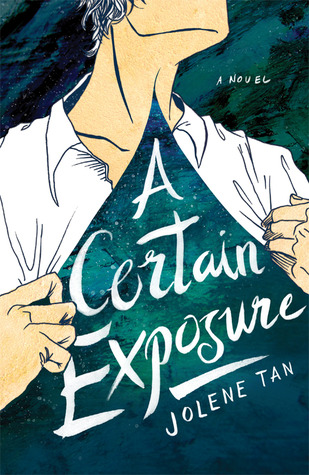Review: A Certain Exposure by Jolene Tan (Epigram Books, 2014)
Author: Jolene Tan
Publisher: Epigram Books
Publication Date: April 2014

[Before I proceed with this review, let me provide a categorical disclaimer: I’ve known Jolene for, wow, is it four years now? and have the highest respect for her work. Take this disclosure of potential prejudice for what you will. P.S.: I paid for my copy of the book, fair and square!]
Lawyer and activist Jolene Tan burst into the Singapore literary scene this year. Her first novel, A Certain Exposure follows twin brothers Brian and Andrew through the late 1980s and the 1990s, from their family apartment in a Singapore public housing estate to Andrew’s suicide in a Cambridge dorm room. The narrative jumps between their uneasy fraternity during the turbulence of high school, to Brian’s survivor’s guilt in the confines of lower-middle-class Chinese morality.
While she is a seasoned writer currently working in public relations, A Certain Exposure is Tan’s first major work of fiction, and this rawness is apparent in her prose, despite Jason Erik Lundberg’s editing.
Certain sentence formulations come across as clunky—her opening line, “Brian organised for the body to be flown back,” has become, among reviewers, a somewhat notorious example of this flaw. There is also a tendency, which I personally dislike, to over-explain the quintessentially Singaporean elements of the narrative, but Tan restrains this urge much better than many other Singaporean Anglophone writers. And although I was not too bothered by the frequent shifts between settings, the jumpy cuts between different points of view can be much more jarring, because each change comes with the need to introduce yet another bit player’s life story.
Nonetheless, these minor aesthetic weaknesses, in what is otherwise stolid prose, cannot detract from the importance of Tan’s contribution to Singaporean literature. A Certain Exposure is a measured attack on the dominant statal narratives that govern public life in Singapore, and Tan carefully takes apart critical national myths like racial harmony, meritocracy, and post-feminist gender equality.
Thematically, Tan’s novel re-treads the terrain of already-familiar criticism; but the book is ground-breaking in its refusal to pussyfoot around its subject matter. For example, unlike Lydia Kwa’s Pulse (first published in a limited print run in 2010 and re-released just last month), Tan does not wait till the novel’s final pages to implicate the criminality of gay identity as a reason for Andrew’s suicide. Nor does she, with coy delicacy, avoid the word rape—nor the implication of colourist misogyny—in the scene where a survivor of campus assault testifies to an unsympathetic school administrator.
Interestingly, the editor at Singapore’s leading literary magazine QLRS absolutely hated A Certain Exposure. Toh Hsien Min wrote in his review:
How many issues can a writer cram into one novel? Let's do a count: there's the racism issue, the elitism issue, the capitalism issue, the Christian issue, the teenage intimacy issue, the rape issue, the bullying issue, the misogynist issue and, for good measure, both the gay and lesbian issues. […] Overall, this makes the novel feel like an attempt to assert left-wing liberal credentials for the sake of being left-wing and liberal, not because of having anything urgent or original to say. “Sometimes people are their own worst enemies”, says one of the civil servants in an especially bad set piece. Indeed: this has gone beyond preaching to the converted to the point of preaching to inadvertently unconvert the converted — it made this Guardian reader feel a little queasy, only stopping from reaching for a copy of the Times of London by wondering if the novel is quintessentially Singaporean because of that Singaporean inability to get the chip off the shoulder.
Was it hard, lifting a hatchet that heavy to the novel? Tan’s novel is a killer debut, one that resounds urgently for the very reason, I suspect, that Toh despises it: the racism “issue,” the rape “issue,” the misogyny “issue,” the homophobia “issue” are all symptoms of deep-set and deeply denied systems of inequality in contemporary Singapore.
Fresh out of high school myself, I can attest to the fact that the events that Toh finds heavy-handed go on with as much unrelenting regularity in real life as in the novel. Tan herself, who attended Singapore’s top-tier Raffles schools before going on to Cambridge and Harvard, told The Straits Times’ Akshita Nanda: “There was a boy in school, everybody knew the rugby players had taken him into a toilet and pissed on him. Or this girl who everybody knew had had sex on a pool table, but it never occurred to me to think about what went on behind that knowledge.” Campus rape is no less a problem in Singaporean high schools than in USAmerican ones, and it is A Certain Exposure’s honesty that makes it difficult to read and difficult to put down.
Tan’s authorial decision to situate A Certain Exposure two decades in the past—during the very era of economic transformation—is a considered choice that forces the reader to interrogate how much Singapore has progressed in its journey “from Third World to First.” It loses nothing of its impact by its distance, even if the omniscient narrator’s occasional flash-forward asides feel forced.
All in all, A Certain Exposure is a powerful work of social realism—ask any queer, minority and/or woman between 18 and 25 who grew up here, and they’ll say how real it is—and a welcome addition to our still-limited Anglophone-novel canon.
Once you’re done with A Certain Exposure, pick up Balli Kaur Jaswal’s 2013 novel Inheritance, which examines the psychological and cultural sacrifices made by a middle-class Punjabi Sikh household in the industrialising Singapore of the 1970s through 1990s.
Buy the book online at: Epigram Books | Select Books | Books Kinokuniya


